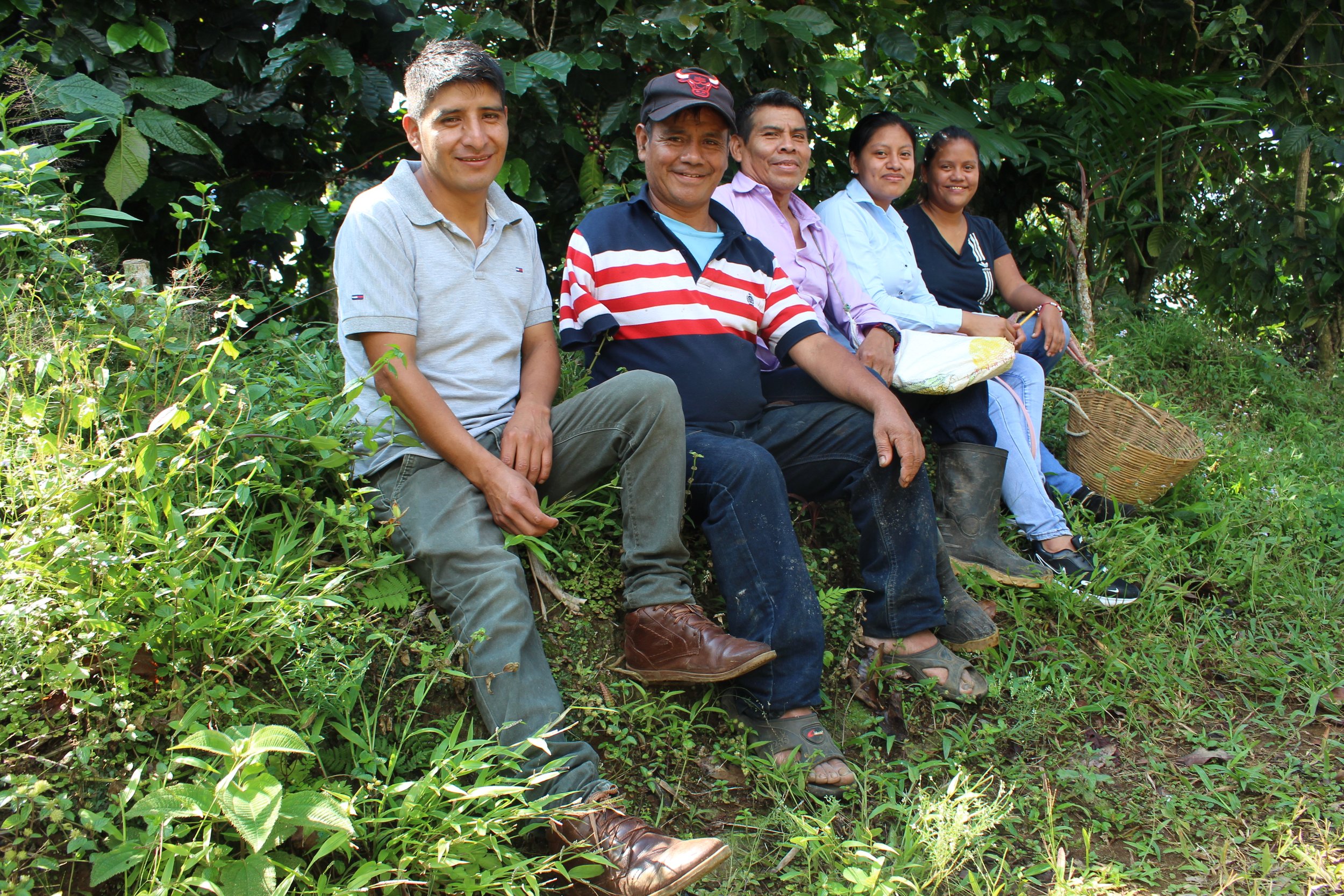Where Hope Lies | Migration’s Impact on Coffee Communities
By Aliisa Oake
Disruptions in Guatemala’s Coffee Communities
Guatemala’s coffee industry has encountered several challenges in the past few years, which have disrupted crop yields significantly. Climate change is one of the biggest issues, which has led to altering traditional growing conditions due to unpredictable weather patterns like irregular rainfall and high temperatures. This has led to the spread of roya, or coffee leaf rust, a plant killing disease. This rapidly spreading fungi peaked in Guatemala in 2012 and impacted about 59-70% of coffee-producing areas, heavily impacting farmers’ productivity and profitability levels. Unpredictable weather conditions and lack of information has posed a new challenge, disrupting harvest levels and profits.
Economic factors related to the constantly changing coffee prices and limited access to financing have further impacted the industry. The coffee sector has not been providing a reliable source of income and many smallholder farmers have struggled to compete in the global coffee market, which is dominated by larger producers. This has resulted in people having less of a desire to live in rural communities, leading to people migrating away from coffee-growing regions. Increased production costs combined with lack of labor has added even more pressure towards finding a solution, and quickly.
The rich aroma of coffee, once symbolized as hope and prosperity, now faces new threats from an unpredictable course. Producers who were once used to tradition, are now struggling with threats to their treasured crops. The harsh realities of climate change and relentless pests have led coffee producers to come to a turning point, between the prospect of the thought of a more stable future away or remain on the land owned by generations before them.
A Crossroad for Coffee Producers
The migration problem in Guatemala’s coffee communities is driven by a desire for a change and better quality of life. Whether internally or externally, migration is viewed as a pathway for improved economic conditions, especially after facing challenges of low wages, climate change, and global market pressures. Younger generations are leaning towards obtaining more access to education and a stable job, overall escaping the stress and uncertainties involved in coffee cultivation. Many men have left their families behind to work in nearby cities, with hopes of a more reliable source of income. This creates the problem of experienced workers taking valuable skills and knowledge with them, leading to restraints in the development of sustainable practices and innovations within the industry.
Regardless of the industry, younger generations are the face of the future. The decisions they make may represent their society’s values and beliefs, bringing about greater development and change to their community. In many coffee communities in Guatemala, these younger generations are faced with two options: becoming more involved in the industry or leaving in search of new opportunities. Unfortunately, not everyone is as interested in remaining in their communities as they once were in the past, which can lead to problems such as the potential for diminishing the heritage and unique culture tied to coffee cultivation.
The Impact of Migration on Communities
Migration plays a substantial role in the dynamics of communities that are dedicated to coffee cultivation. The largest impact is through the reduction of labor, where producers who remain in coffee growing regions have experienced difficulties in finding enough laborers to pick coffee cherries and work to produce their cherished, high-quality coffee. As younger generations leave communities, demographic imbalances are created. With older and aging generations left behind to manage farms, lower production levels are created. There is a risk of losing agricultural knowledge and skills if vital information about quality coffee production is not utilized.
Moving away from rural communities in hopes for a more successful life may provide immediate relief, but it also presents complex challenges in threatening the sustainability and resilience of coffee communities in the long term. On some occasions, when members leave communities for short-term jobs and later return economic disparities may emerge. A divide may emerge between migrant families who achieve greater financial success, and those who remain, which may lead to a feeling of resentment or weakened community ties. Although this may occur, those who send money back home to their families assist in improving the local economy and providing financial support.
Overcoming Migration
By overcoming past challenges in coffee communities, producers have continued to persevere, while being optimistic and making a change of approach. When men move away from rural towns, women and younger generations have begun to play more vital roles in their communities. Many women are beginning to acquire leadership positions within their cooperatives and use their skills to further enhance the production and quality of coffee. This involvement empowers them economically and fosters community resilience.
Younger generations who remain in their communities are using what was taught to them by the generations before them, incorporating more innovative practices in the industry. By using the resources available to them and taking our rapidly changing world into account, they have embraced the use of technology and sustainable farming techniques. Additionally, with a growing awareness of the competitiveness involved in global coffee markets, quality of coffee over quantity has been prioritized.
La Suiza Cooperative and the Impacts of Migration
The community of our partner cooperative, La Suiza, has faced the pressure of internal and external migration. Being located in a remote area in the mountains of Nuevo Progreso, many men in the community have left their families behind to secure more reliable jobs in the city of San Marcos. Some of them have sent money back to their families after leaving for longer periods at a time, where others have left without a trace. This has led to a societal shift, where women are more involved in coffee production and the overall business.
Many of De La Gente’s partner cooperatives have full-time members of staff that work in administration and other areas to ensure efficient production levels. More specifically, some of the men of La Suiza Cooperative who were selected to be part of the board turned the position down after obtaining higher paying jobs in San Marcos. Instead of completely abandoning their community, they provided guidance to their children in being able to fulfill the position instead.
Women whose husbands have left their families have stepped up by taking more of an initiative in overcoming this abandonment by engaging more deeply in coffee cultivation. They are actively seeking out new opportunities, embracing innovative farming techniques, and working more closely in their cooperative networks. Their contributions have been vital to their families’ livelihoods as well as the broader agricultural landscape in Guatemala, showcasing the potential that women have in the coffee industry.
The successes of women in the coffee community of La Suiza are evident in several ways. Maria, is the mother of eight children and her husband left their family for better opportunities without turning back. She persevered and took advantage of what was available to her by learning about the steps involved in coffee production, working towards expanding and purchasing more land.
Tatiana, who’s father, Fernando was elected to be a board member. He passed the position to his 20 year old daughter, who has been working as a secretary at La Suiza, managing and facilitating logistical operations, while also working another job in a nearby town. Another cooperative member, Rafael, was selected to be part of the board and passed the position to his 23 year old daughter Esmeralda. Both Tatiana and Esmeralda have been working with coffee for three years, these positions allowing them to have even more opportunities and exposure to the industry. Although the reality of the situation is incredibly difficult, this has been especially influential in building confidence in women to be able to do jobs traditionally obtained by men.
Recently, it has been more difficult for members at La Suiza to encourage young people to grow coffee, which is crucial for the continuity of the industry. Mynor Roblero, a cooperative member at La Suiza has had some experience with participating in classes with Anacafe (National Coffee Association in Guatemala), which has provided him with more knowledge and passion for the growth of the industry within his community. After speaking with him about the problem of younger generations moving away from coffee cultivation, he shared some of his thoughts on this issue and overcoming it.
“Firstly, [young people need to] get involved so that the tradition of planting coffee and producing it is not lost. Second is to make them aware of coffee, for example, here in Guatemala many of us do not know what coffee schools are.
Here we could also have young people who do not leave and give up coffee, but who know their coffee and know how to market it. It is something that would generate more production for the community and be sustainable so that they do not emigrate!”
It’s important for coffee communities like La Suiza to honor their roots and tradition in efforts to retain local talent, especially being located in a more remote area. Providing alternatives and innovation for the future will diminish the desire for coffee producers to feel the need to migrate and leave their communities. Young generations who remain and find new opportunities with coffee cultivation showcase potential to enhance their heritage and continue expanding their vibrant and sustainable coffee community.
De La Gente’s Insights and How Consumers Can Help
After becoming aware of the issue of coffee producers’ desire to expand their horizons in moving away from cultivation, De La Gente has provided guidance on how producers can be more self-sufficient and have alternative incomes. With financial insecurities being one of the reasons for migration, they recommended and encouraged farmers to diversify their crops, whether for personal consumption or for sale. Additionally, workshops for young people open up a pathway for obtaining new knowledge so that more people can learn about different areas of the industry.
“There was a Cáritas project, [an organization that works to improve access for community development and ending poverty], working with small producers. They supervised the land and gave us supplies … They took eight young people to a coffee school and we learned a lot from the experiences of other farmers.
That was where I recognized the importance of making our experiences known to other people because many have their land but don’t know if their coffee is good quality or they sell it on the streets, and that is why there is not much development.” - Mynor Roblero
By providing a direct platform for producers to sell their coffee and assisting in building connections between them and roasters, communities are able to raise funds for community development. Living qualities of coffee communities have improved substantially and continue to do so, which makes remaining in these areas more desirable. For instance, La Suiza Cooperative has more access to electricity and many developments were made in houses, which were mainly made from cement walls and tin roofs in the past.
The international community of coffee consumers need to realize that coffee is an essential agricultural product in Guatemala’s development. Coffee roasters and buyers need to consider the product beyond the profit, as they represent a community of hardworking people. The dedication they have the power to create directly impacts the lives that uphold the coffee culture of Guatemala.
About the Author
My name is Aliisa Oake, I’m a Marketing and Communications Intern at De La Gente with a Bachelor’s Degree in Marketing and a minor International Business. I’m a coffee lover from New Jersey with a passion for coffee, supporting the industry, along with supporting local communities and sustainable initiatives. I’m excited to work with De La Gente and learn more about Guatemala’s coffee!







